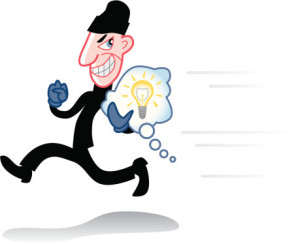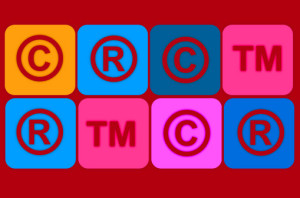Before you can truly succeed in business, you need to learn the lingo. You can’t be the next Steve Wynn until you understand the difference between a copyright, a trademark, and a patent. As someone who is going to be making and branding things and hopefully earning money from those things she has made and branded, knowing what kind of legal protection you need to file to declare those things “yours” is important.
So what’s the difference?
Copyright
A copyright is probably the most common (and easiest to get) form of protection of something that you have authored and that is solely yours, whether that is an article, a book, a piece of music, a script (and the visual representations thereof), etc. You file a copyright with the Copyright Office of the Library of Congress.
Here’s the thing about a copyright: You don’t have to publish something for it to be copyrighted. It covers unpublished stuff, too. What’s more, things get murky when you start to talk about derivative works, artistic license, reprinting, etc. For more information on copyrights and how they work, go here.
Trademark
A trademark is a word, or logo, or symbol or even a name that is used to distinguish your thing from someone else’s thing — even if those two things are very similar. It is very similar to a “service mark” (which applies to sources of things instead of the things themselves).
You can, for example, trademark your business name and logo, which should then prevent other people from slapping your name or logo on their own products and piggybacking off the hard work you’ve done to build your brand.
It’s why, for example, if you make a shoe, you can’t simply stick a swoosh on it and hope people will believe it’s really a Nike, allowing you to profit off of that assumption.
Patent
Patents are for inventions and they say, definitively, to whom something that has been invented belongs. This doesn’t always apply to finished machines — they can be applied to parts of machines or systems. If someone wants to use that part or system for their own profit, they need to work with you to make sure you are compensated and given proper credit.
To this extent, when you invent something or come up with something, it’s good to do a patent search to make sure that there isn’t something just like it that already has a patent attached.

This is the last thing you need to have happen!
To put these things more simply:
- If you authored it, it needs a copyright.
- If it is part of your identity, it needs a trademark.
- If you invented it, it needs a patent.
The legalities of each of these things vary depending on a plethora of independent details that are specific to your situation. If you aren’t sure what you need (or which legal issues apply to you), contact The United States Patent and Trademark Office.
Erin Steiner writes about a variety of different ideas and topics ranging from online reputation management to Facebook recruiting from her “home base” in Portland, Oregon.
 Entrepreneur Resources Your source for small business information
Entrepreneur Resources Your source for small business information





